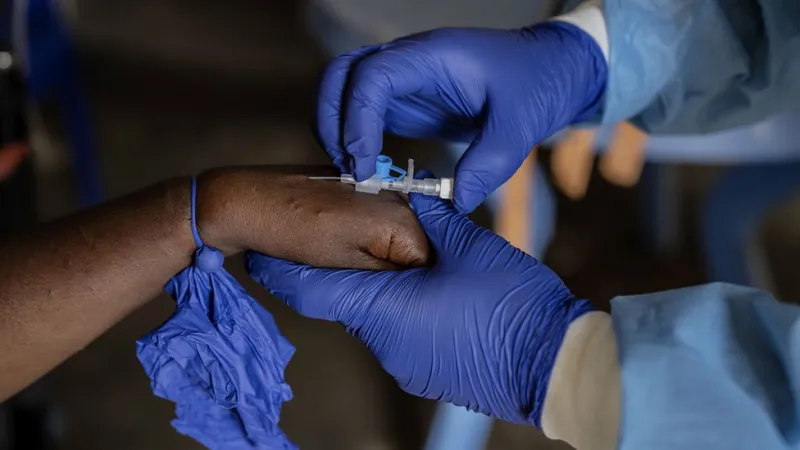
Experts Believe Mpox Cases in Congo May Be Stabilizing, Urgent Need for Vaccines Persists
2024-11-04
Author: Rajesh
In a cautiously optimistic development, health officials are reporting signs that mpox cases in the Democratic Republic of the Congo (DRC) may be stabilizing, potentially indicating a decline in the epidemic. Recent data from the World Health Organization (WHO) reveals that the DRC has been recording between 200 and 300 laboratory-confirmed mpox cases weekly— a marked decrease from the nearly 400 cases per week reported in July.
This decline is particularly noticeable in Kamituga, a mining town in eastern Congo, where the new, highly transmissible variant of mpox was first identified. Despite this reduction in reported cases, WHO officials have cautioned that only 40% to 50% of suspected infections are currently being tested, meaning that the virus continues to spread sporadically across different regions, including in Uganda.
While the decrease in infections is promising, the specific behaviors driving the outbreak remain unclear. Health experts are expressing frustration over the limited vaccine supply, with only 265,000 doses available to a country with a population of about 110 million. So far, it is estimated that only 50,000 people in the DRC have received the vaccine.
Dr. Zakary Rhissa, head of operations for the humanitarian organization Alima in Congo, emphasizes the urgent need for a broader vaccination effort across Africa to not only halt the spread of mpox but also prevent unwelcome genetic mutations that could arise from continued transmission. "If we miss this opportunity, the likelihood of another significant outbreak increases substantially," he warned.
As of this year, there have been around 43,000 suspected mpox cases reported across Africa, with over 1,000 deaths, predominantly in Congo. The 2017 outbreak in Nigeria serves as a stark reminder of the potential for outbreaks to escalate without effective intervention, leading to global events like the 2022 mpox outbreak which affected more than 100 countries.
In Kamituga, health officials view the reduction in cases as a vital opportunity to enhance vaccination initiatives as well as education and surveillance campaigns. Local residents like Georgette Hamuli, an 18-year-old sex worker, recently learned about the risks associated with mpox when vaccination teams visited her community. “They told us we're highly exposed to the risk of infection,” she noted, emphasizing the importance of both protection and education in high-risk environments.
The Africa Centres for Disease Control and Prevention (Africa CDC) estimates that the DRC will require at least 3 million mpox vaccines to effectively combat the virus, while an additional 7 million doses are needed for the rest of the continent. Currently, the WHO and its partners have pledged 900,000 vaccines to nine African countries impacted by mpox, aiming to secure a total of 6 million doses by the end of the year.
Notably, mpox outbreaks have also originated in Burundi, Kenya, Rwanda, and Uganda, with cases reported in travelers to countries including Sweden, Germany, India, and the United Kingdom.
Despite these developments, fewer than half of the people at highest risk in Congo have received the vaccine. Tara Kerr, the Congo director for the International Rescue Committee, raised concerns about the continued low supply: "We only have a tiny amount of vaccines, and there are no provisions for children."
The situation is further complicated by the nature of the virus's transmission, which includes sexual contact and potential spillover effects from infected animals. Dr. Salim Abdool Karim, an infectious diseases expert at the University of KwaZulu-Natal in South Africa, pointed out that mpox outbreaks often have a rapid onset and resolution but noted that this epidemic is particularly nuanced.
“The reality is, we are in new territory with mpox this time," Karim said. "But we’re never going to resolve this until we can effectively vaccinate the majority of the population. The health and safety of communities depend on it."
With adequate global support and a proactive public health strategy, public health authorities hope to contain the mpox virus and prevent future outbreaks that could have far-reaching implications both locally and globally.




 Brasil (PT)
Brasil (PT)
 Canada (EN)
Canada (EN)
 Chile (ES)
Chile (ES)
 España (ES)
España (ES)
 France (FR)
France (FR)
 Hong Kong (EN)
Hong Kong (EN)
 Italia (IT)
Italia (IT)
 日本 (JA)
日本 (JA)
 Magyarország (HU)
Magyarország (HU)
 Norge (NO)
Norge (NO)
 Polska (PL)
Polska (PL)
 Schweiz (DE)
Schweiz (DE)
 Singapore (EN)
Singapore (EN)
 Sverige (SV)
Sverige (SV)
 Suomi (FI)
Suomi (FI)
 Türkiye (TR)
Türkiye (TR)